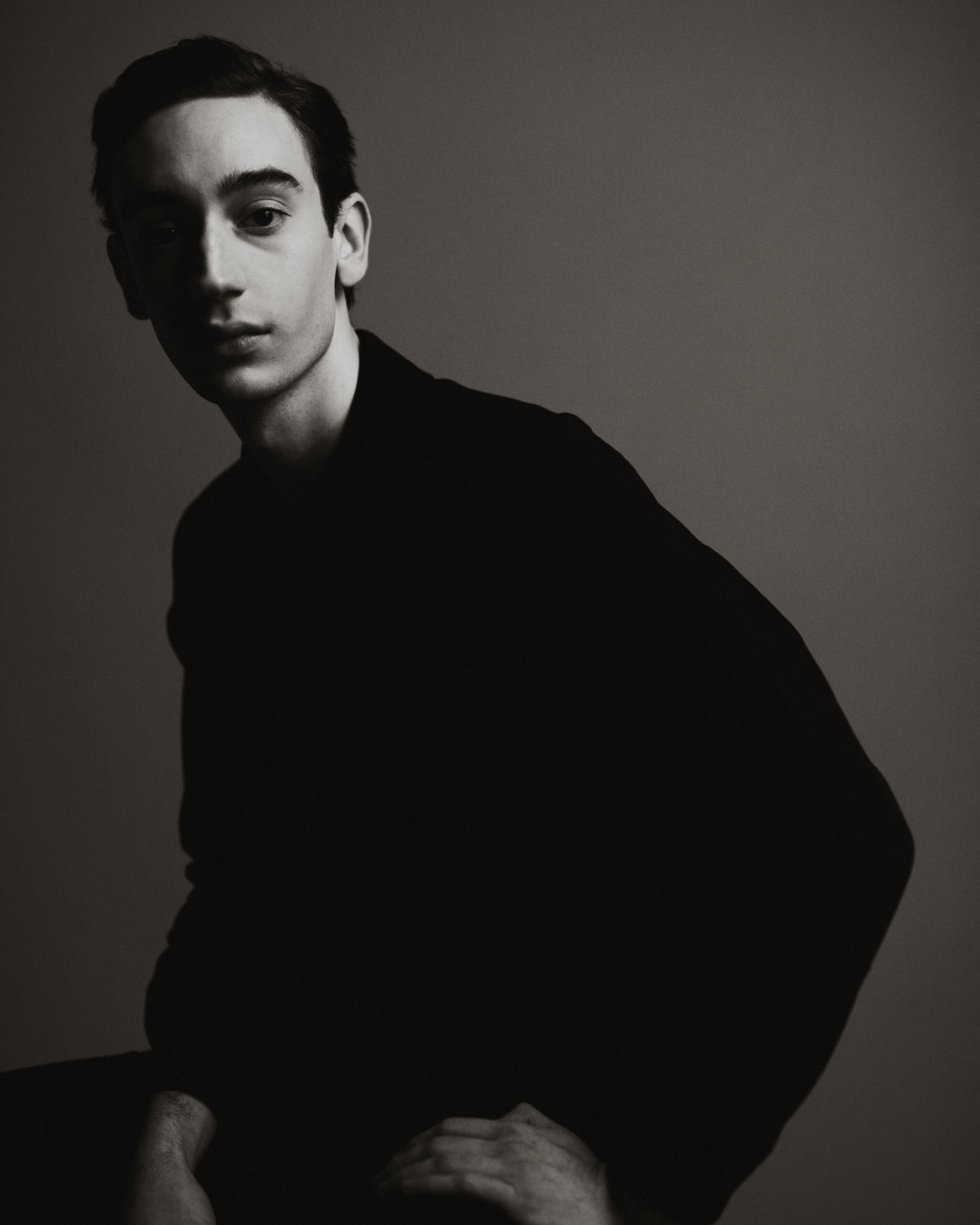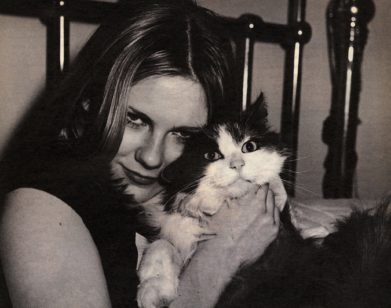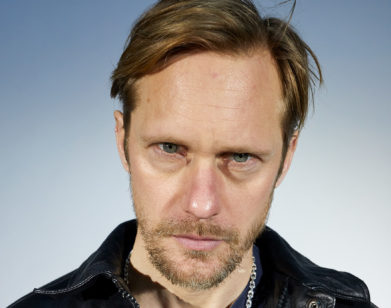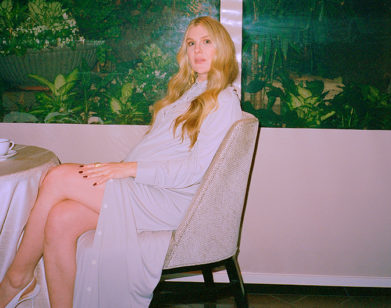NEWCOMER
Théodore Pellerin Is Coming to a Theater Near You. And He’s Wearing Stilettos.
The movie Solo begins with Théodore Pellerin glittering his way through ABBA’s “Voulez-Vous.” Across his decade-long screen career, the 26-year-old Canadian actor has become, in the song’s parlance, a master of the scene. Pellerin’s wide eyes and lithe frame can convey reckless ambition, as seen in his breakthrough American role in the under-appreciated Kirsten Dunst series On Becoming a God in Central Florida, or alluring menace, as perfectly calibrated in the Netflix slasher flick There’s Someone Inside Your House. In Solo, Pellerin plays Simon, a charming Montreal drag performer whose stage confidence is threatened when his capricious new boyfriend (Félix Maritaud) reopens old wounds. It’s an electrifying lead turn.
It’s also one of a few splashy Pellerin roles gracing screens this spring. He plays the Marquis de Lafayette opposite Michael Douglas in the Apple TV+ historical series Franklin and a dashing fashion jetsetter opposite Daniel Brühl in Hulu’s Becoming Karl Lagerfeld. Before this year, Pellerin had appeared in Boy Erased, Never Rarely Sometimes Always, The OA, and Beau Is Afraid, establishing himself as a versatile supporting actor who gravitates to risky projects. Solo is his third collaboration with Quebecois director Sophie Dupuis; his first was the 2018 crime drama Family First, in which Pellerin portrayed a foolhardy drug dealer with a sizable handgun tattooed on his taut belly. Last month, over Zoom, I spoke to the rising star about his drag debut, famous co-stars, and what it means to play gay.
———
MATTHEW JACOBS: Hi, Theodore. How are you?
THÉODORE PELLERIN: Hi, Matt. I’m good. How are you?
JACOBS: I’m good. Do people call you Theo?
PELLERIN: Yes, Theo, Theodore, all of that.
JACOBS: Well, this is a huge year for you, or so it seems. You have Solo, Franklin, and Becoming Karl Lagerfeld all rolling out. How are you drinking in this moment?
PELLERIN: Well it’s funny, because all of it, the trailers, and seeing the first episodes of everything, kind of happened while I was shooting. This might not be the right answer, but it’s always so hard to watch something that you’re a part of for the first time, especially when you’re shooting something at the same time. The first time that I had any response to anything, I had to go on set the next day and I was like, “I have to just stop being an actor.” Then I was like, “I have to quit this film that felt so good, but now I have no idea what feels good and what doesn’t.” Then, of course, you let time go by a little bit and you re-watch a few days later and you’re actually able to view the work in its entirety and as a spectator. It’s a little anxiety-inducing every time something comes out, but it’s also very exciting because it’s all things that I’m proud of. And now, I have so many close friends from all of these projects.
JACOBS: Is there something specific that you watched that made you feel that way?
PELLERIN: From what I’ve understood, cinema and television, or whatever an actor does, is really an exercise of projection. As a spectator, of course, there’s a story that unfolds, and then you project your own stuff onto them, onto the story, onto the people who are living them. When it’s you on screen, how can you project anything? Of course, it’s horrifying to see yourself the first time because all you see is your big old face and you’re not really listening to the story because you already know it. You kind of have to let it settle a little bit, and then maybe by the second or the third time, you’re able to view the film or the show as it’s meant to be received.
JACOBS: Sure. Well, all three of your works are pretty opulent costume dramas. You get to wear such decadent clothing. That must make work fun, right?
PELLERIN: Very much so. Of course, it’s such a big part of these projects and it’s so fun when it’s so well-made. All of these costumes and aesthetic worlds were so precise and so well-made that it feeds you so much. Also, Solo is in such a singular world. The set design immediately gives so much, and the same thing with the costumes. Every actor says it, but it’s so true. With Becoming Karl Lagerfeld, it was so important because the character of Jacques [de Bascher] thinks that all eyes are on him at all times. He feels that dandy when he gets into a place. I was like, “So how can I feel this way?” ‘Cause it’s so not me. How can I exude this confidence he has? A big part of it was the costumes. When you do put them on, it gives you the elements of how you should move through the world.
JACOBS: I have to imagine that the beautiful gowns in Solo were more comfortable than the Revolutionary War garb, for example.
PELLERIN: Yes, of course. Doing the whole transformation for Solo, the makeup, and the wigs, and the costumes, it gives that sense of getting onto a stage. That extreme satirical femininity had to feel natural as well, though. When you put on these dresses, something happens. You don’t really have to work that much for it.
JACOBS: Had you done drag before Solo?
PELLERIN: I hadn’t, but we started working quite early in the process to learn to walk in heels and develop a comfort with our own femininity. On stage, you had to feel like this was a space of freedom and liberation. It shouldn’t be something that’s like, “Now I’m playing this, and now I’m going to stop.” I can let go, but also keep an element of that in my daily life. This was fascinating work to also deconstruct my own understanding of how I move through the world and allow myself to tap into that extreme and enjoy it, even though it’s not something that I feel the need to have in my daily life. It was just so enjoyable to be in a space where it was so playful and encouraged and liberated. It took a while, but it was very special. I think it’s always that way, right? In every part, in every project, when you have to stretch yourself and reach for something that is part of you, but you haven’t really allowed yourself to tap into. The first movie I did with Sophie Dupuis, the director of Solo, I played this very violent and menacing kid on the edge of the precipice. I was terrified of that because I had to stretch and allow this sadistic quality to him. Then of course, we all have those things, and once you kind of tap into them, then they’re part of you. They’re not qualities that are enjoyable, sadism and violence, but they are part of us. It’s an act of expansion, I guess.
JACOBS: You’re saying you’ve had a little bit of sadism in you ever since?
PELLERIN: Yes, of course. I mean, no, but yes. You know what I mean?
JACOBS: Did you have a say in the song choices in Solo or in how they were staged?
PELLERIN: That was really Sophie’s work. I think that the musical numbers do a really good job of allowing the story to progress, though. In general, Sophie is very inclusive of her actors.
JACOBS: I won’t spoil the context, but I was really excited when I heard the opening notes of the cover of Perfume Genius’ “Queen,” which is a song that I love. It’s a really big moment when it comes in. Can you talk about preparing for that scene?
PELLERIN: Of course. That’s what closes the film, and it’s actually the first number that we shot. That was the only one that wasn’t choreographed. What was written in the script was, “The character walks up to the stage, takes a breath and starts singing or lip-syncing, and then the credits roll out.” But that’s not what happened. We saw the space and we took some time, just her and I, to figure it out with the music. It was very exhilarating because it was also the first time I was in full drag. It was also the first time all the extras, who were queer people who love drag, who really know it, and it was great to have an audience that was rooting for me.
JACOBS: Well, I don’t want to over-Americanize this conversation, but you have gotten to work with so many impressive Hollywood names over the last several years: Kirsten Dunst, Lucas Hedges, Talia Ryder, Brit Marling, Margaret Qualley, Joaquin Phoenix, Michael Douglas. Who from that list stands out to you?
PELLERIN: It’s a very different experience with all of them. There’s differences in degrees of time spent with them, and friendships develop. Of course, the ones who have impacted me the most are the ones that I’m still very close with. With Kirsten Dunst, I was so young. I was 21, I barely spoke English, and it was a weighty task for me to take on a role like that.
JACOBS: That was an intense role, in a show [On Becoming a God in Central Florida] that had a very specific tone to it.
PELLERIN: Yeah. It’s hard to be free when it’s not your first language and you also have to do an accent and sound native, but I loved her. Of course, I’ve been a fan for so long. She’s such a great actress. She doesn’t have a facade of being nice. She is naturally a nice person, but she won’t smile when she doesn’t feel like smiling, just to say “hi” or say “good morning.” What you see is what you get, or what you get is the real thing always, which is very refreshing. Also, Alice [Moreault], who plays my sister in Solo, I loved working with her. When there’s chemistry with someone and you just look into someone’s eye, then you don’t have to do anything because everything that they give you is true. That’s all that matters when you’re acting, a partner that you can listen to and enjoy listening to.
JACOBS: When you first started, did you aspire to a career beyond Canada?
PELLERIN: Yeah, of course. I don’t think I even thought about Canada. I thought about Québec. I’ve always been very proud, of course, of where I come from, and that’s why I still live in Montreal and that’s why I still work here. It’s really important for me to work here and, as an actor, to work in your own tongue, your own language, your own accent. To still be in touch with that is very nourishing for me. But there was always a sense of, “I want to have access to the best material.” And that’s why I feel so privileged to be able to work in the States and work in France. I love working almost constantly, but I always want it to be something that I’m excited about doing.
JACOBS: And you got to be slapped in the face by Kirsten Dunst.
PELLERIN: Slapped in the face, choked, put her fingers in my mouth. [Laughs] It was great. I loved her. It felt very playful and fun to be with her.
JACOBS: Older gay actors have often talked about not having had a lot of gay roles to choose from, but you were able to indulge in that from your very first role in 30 Vies. What has that meant to you over the years?
PELLERIN: I didn’t love that at all. I hated it. It was very confrontational, and I didn’t feel comfortable at all. I wasn’t really ready for that. I don’t think that I really knew anything about myself that much and I had to work against the role, in the sense that it didn’t feel liberating or exciting.
JACOBS: And you were young.
PELLERIN: I was 16, and everything is scary then, of course. It was also a different world 10 years ago. I do think that things have changed a lot. I was worried for a while to do too many gay roles or queer roles, but now I’m like, it has nothing to do with sexuality because the themes are about so much more. I don’t even feel like I’m being pigeonholed or typecast. And if people care about that, then I don’t really want to work with you anyway.
JACOBS: Right, because you wouldn’t want to not be thought of for something like Never Rarely Sometimes Always, for example, which required you to be this—
PELLERIN: I love being a dirty, straight guy.
JACOBS: Exactly.
PELLERIN: I love that. It’s completely part of me, somewhere. I do think that working in France and the States allows for that. In France and the States, the offers I get, or what I go for, or what is projected onto me, is very different. I kind of love that, to be able to navigate those things.
JACOBS: Right now, who are some directors you’d really love to work with?
PELLERIN: Oh, there’s so many. I love Joachim Trier. I love Eliza Hittman. I know I’ve already worked with her, but I love her so much, and I was so intimidated when I worked with her. I should have a list to be able to answer that in a proper way. Justin Triet, Jonathan Glazer. There’s like, 15 names or something.
JACOBS: I want to see you in a Joachim Trier movie. I want to see you in the next The Worst Person in the World.
PELLERIN: Oh my God, I love that. It’s so good. Oslo, August 31st is such a masterpiece.
JACOBS: Well, I’m really excited about this year that you’re having. I’ve been keeping up with you since On Becoming a God in Central Florida and it’s been fun to see your rise.
PELLERIN: Thank you, Matt. That’s very kind.







